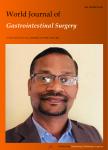Timing of chemotherapy and survival in patients with resectable gastric adenocarcinoma
作者机构:Division of Surgical Oncology City of Hope Comprehensive Cancer Center Department of Biostatistics City of Hope Comprehensive Cancer Center Department of Surgery University of Southern California Department of Surgery Harbor-UCLA Medical Center Division of Colorectal Surgery Memorial Sloan-Kettering Cancer Center
出 版 物:《World Journal of Gastrointestinal Surgery》 (世界胃肠外科杂志(英文版)(电子版))
年 卷 期:2013年第5卷第12期
页 面:321-328页
学科分类:1002[医学-临床医学] 100214[医学-肿瘤学] 10[医学]
基 金:NCI NIH HHS [P30 CA033572] Funding Source: Medline
主 题:Chemotherapy Gastric cancer Adjunct therapy Postoperative therapy Preoperative therapy Timing
摘 要:AIM: To evaluate the timing of chemotherapy in gastric cancer by comparing survival outcomes in treatment groups. METHODS: Patients with surgically resected gastric adenocarcinoma from 1988 to 2006 were identified from the Los Angeles County Cancer Surveillance Program. To evaluate the population most likely to receive and/or benefit from adjunct chemotherapy, inclusion criteria consisted of Stage Ⅱ or Ⅲ gastric cancer patients 18 years of age who underwent curative-intentsurgical resection. Patients were categorized into three groups according to the receipt of chemotherapy:(1) no chemotherapy;(2) preoperative chemotherapy; or(3) postoperative chemotherapy. Clinical and pathologic characteristics were compared across the different treatment ***: Of 1518 patients with surgically resected gastric cancer, 327(21.5%) received perioperative chemotherapy. The majority of these 327 patients were male(68%) with a mean age of 61.5 years; and they were significantly younger than non-chemotherapy patients(mean age, 70.7; P 0.001). Most patients had tumors frequently located in the distal stomach(34.5%). Preoperative chemotherapy was administered to 11.3% of patients(n = 37) and postoperative therapy to 88.7% of patients(n = 290). An overall survival benefit according to timing of chemotherapy was not observed on univariate or multivariate analysis. Similar results were observed with stagespecific survival analyses(5-year overall survival: Stage Ⅱ, 25% vs 30%, respectively; Stage Ⅲ, 14% vs 11%, respectively). Therefore, our results do not identify a survival advantage for specific timing of chemotherapy in locally advanced gastric cancer. CONCLUSION: This study supports the implementation of a randomized trial comparing the timing of perioperative therapy in patients with locally advanced gastric cancer.



